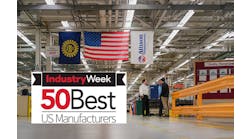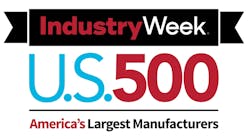Employee Engagement, Business Vitality and Community Prosperity
According to the Gallop “State of the American Workplace” report, only 25% of manufacturing employees feel engaged — the lowest percentage of all major occupations. How do we begin to turn this around?
I have to believe that helping employees better understand how the direct actions they take to improve company performance also increase community prosperity will drive a positively reinforcing loop of higher engagement. After all, their communities are where they live and raise their families. If each manufacturing worker understood how the prosperity of their local community depended, to some extent, on their employer, they would have a greater sense of purpose about their work — and therefore become more engaged.
I’d like to explore this idea of connecting manufacturing workers to their communities through the businesses they work for via the lens of “Good Money, Neutral Money and Bad Money,” as explained to me by Ed Morrison of Purdue University’s Agile Strategy Lab. It’s the economic philosophy espoused by David Morgenthaler. Morgenthaler was influenced by Dr. Goldratt’s Theory of Constraints (TOC), and interpreted three key measurements to explain how regional and community economies work. Building on TOC’s Throughput, Inventory and Operating Expense, he developed the concepts of Good Money, Neutral Money and Bad Money.
Good Money, Neutral Money and Bad Money
Good money comes into regions and communities from outside them. Consider tourism and hospitality dollars, local manufacturers sending their products to non-local customers, and local software developers providing their solutions to anywhere on the planet.
Once arrived, Good Money begins to circulate as Neutral Money as it passes through the gas station, the grocery store, the hairdresser, tire and oil-change shop, diner, boot store, and church donation plate. After six or seven circulations, taxes have effectively reduced it to zero. Neutral Money becomes Bad Money for an economy when it leaves. Think Amazon, Zappo’s, and the purchase of raw materials from outside.
It seems to me that communities prosper more when they increase and accelerate Good Money, accelerate Neutral Money, and diminish and decelerate Bad Money. Manufacturers, in particular, have a key role to play in accelerating and increasing Good Money in their communities.
Manufacturers and Their Communities
There are four necessary but not sufficient conditions for increasing a community’s prosperity — conditions that can only be created, maintained, and grown through intentional, purposeful civic collaboration. A community must:
- Be a quality, connected place, both physically and virtually
- Have a 21st century workforce and talent pipeline
- Be culturally innovative, entrepreneurial, collaborative
- Have and tell a new narrative
In communities with a manufacturing base, manufacturers and policy-makers must effectively collaborate to create these conditions for manufacturing success. Examples include exposing high-school students to manufacturing, easing permitting, and providing manufacturing-related curricula at high schools and community colleges.
An underappreciated need is to strengthen the collaborative advantage of community and regional manufacturers. This means setting aside historic grievances that may exist (perhaps with roots in talent-poaching), finding common ground, and crossing real and imaginary boundaries to tackle common or complex problems, or to take advantage of mutually beneficial opportunities.
Good Money is more abundant when manufacturers compete and win globally, to sell more products and generate more profits. To do so, they must get better more quickly than competitors in the domains that matter most by lowering costs, achieving higher quality, guaranteeing better delivery, and innovating more effectively. This type of business excellence can be hard to achieve unaided.
In most cases where a manufacturer achieves competitive advantage, it’s a community effort. If a manufacturer needs to better automate and use robots or needs to reduce shipping and warehousing costs or needs to develop an apprenticeship program, expertise, information, and other resources to help with these challenges are likely available in their community.
Without an effective community framework for collaboration, those resources may go untapped. When that happens, business excellence eludes a firm, and less Good Money comes into the community via that manufacturer, and it does so at a slower rate. As the influx of Good Money declines, there will be less Neutral Money and the amount of Bad Money will continue to increase.
Why Manufacturers Matter So Much
Very reductively, the idea is this: Community economies work in a simple fashion. There are three types of money:
- Good Money (outside)
- Neutral Money (already in circulation)
- Bad Money (money that is going outside)
Small businesses that cater to customers outside of their community — such as small manufacturers — bring Good Money into their communities. Good Money helps create jobs through a job multiplier effect, such as supporting community-based services (e.g., gas stations, etc.).
Communicating this important economic role that your "Good Money" company plays in your community to your employees can help improve morale and instill them with a sense of mission vs. just treating their jobs like a paycheck.
Alistair Stewart
Alistair Stewart is a Specialist at the Montana Manufacturing Extension Center, part of the MEP National NetworkTM. He has extensive experience leveraging operational excellence to accelerate and improve portfolio company performance for private equity investors, including consulting practice leadership with Giga Information Group (now Forrester) and positions of increasing responsibility with firms such as Baxter Healthcare, British Gas, and British Technology Group. He is Montana’s only Certified Exit Planning Advisor.





